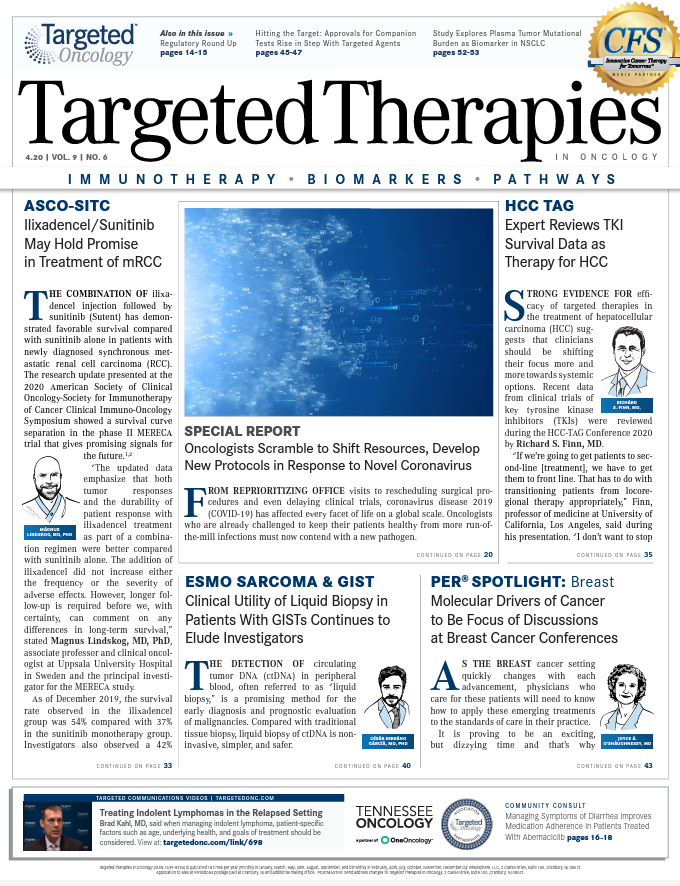COVID-19 Vaccine Response Reminds National Leaders About Importance of Clinical Research
"This infectious disease would have likely wiped out many communities only decades ago. It is true that our highly connected and peripatetic society may have increased exposures across the world. Yet, we have risen to the occasion and implemented public health screening, testing, and treatment strategies."

As Targeted Therapies inOncology continues to report on important advances in cancer research and treatment, it is clear that the spring of 2020 will be remembered for a long time as the era of coronavirus disease 2019 (COVID-19). All of us have had our lives and professionalactivitiessubstantiallydisrupted, with daily activities being overwhelmed by potential exposures to the virus, caring for those afflicted with it, and its impact on cancer treatment and research. This has permeated throughout our medical centers, cancer centers, and educational institutions; indeed, it has devastated the worldwide economy. How should we, as oncologists and cancer researchers, respond? After this crisis passes, according to conventional wisdom, is there anopportunityto improve our efforts for patients battling cancer, and what can be learned?
A variety of opportunitiesexist, including reinforcing and reminding our national leaders about the importance of drugs and their impact on infectious diseases attributed to viruses (which cause nearly 20% of the world’s cancers) and the importance of clinical research to develop new therapies. The utilityof anti-interleukin6drugs, hydroxychloroquine and derivatives, and other drugs for repurposing has implications for once we finally have successfulpublic health and medical management of COVID-19 exposures. This may be a lesson that we wish toremember as we articulate the importanceof National Institutes of Health research, clinicaltrials, and robust big data tracking of patient outcomes, which have enabled anecdotes to be translated into effective therapy much faster using real-world data than prospective randomized phase III trials (the process by which new therapies typically make it to the clinic). The FDA is rapidly moving to approve testing with faster, 5- to 15-minute turnaround, loosening the regulations to speed testing of new drugs,as well as potential vaccines, in healthy individuals and those at risk. In addition, we now are faced again with a disproportionate impact on the elderly and aged individuals,who are at particular risk of morbidity and mortality due to COVID-19.
Successful public health efforts for patients with cancer were recognized for their impact at the beginning of 2020, when American Cancer Society’s annual report to the nation demonstrated the largest reduction in cancer incidence ever reported, primarily driven by reductions in lung cancer. Smoking cessation and reduction of risk factors for lung cancer have demonstrated that time, funding, and effort have been well spent, and similar public health initiatives now being successfully implemented include social distancing and other contact precautions to limitviruspropagation and COVID-19infections. In addition to public health, developing new therapies for antiviral treatment and boosting immunity are key. The cancer research and treatment community can take pride in the successful efforts implemented in team science and a team-oriented publichealth effort. The public understands that we are in a war against this virus, much as they feel that we have been at war with cancer, as it was designated decades ago.
Therefore, as we go to press in April 2020, following the incidence and mortality curves of our friends in Asia, Europe, and the rest of the world, now penetrating in clusters across the United States, we wish all well. We are tremendously gratified and humbled to watch the altruism of clinical caregivers toward each other as they share available personal protective equipment, knowledge, and scientific advances across the world. The resiliency and capability of humankind and the organizational structure of scientific research and clinical treatment are, again, tremendous examples. This infectious disease would have likely wiped out many communities only decades ago. It is true that our highly connected and peripatetic society may have increased exposures across the world. Yet, we have risen to the occasion and implemented public health screening, testing, and treatment strategies. The tragedy for those whose lives have been lost is palpable, and our condolences go out to those families. Efforts to combat this virus are also another reminder of the potency of the human immune system, which we augment forantiviral protection in addition to harnessing it for innovative cancer treatments. Perhaps there are additional lessons we will learn from this crisis.
Reference:
Siegel RL, Miller KD, Jemal A. Cancer statistics, 2020.CA Cancer J Clin. 2020;70(1):7–30. doi:10.3322/caac.21590.
